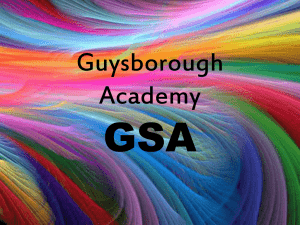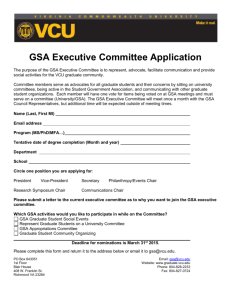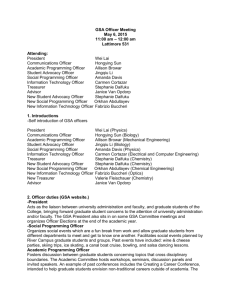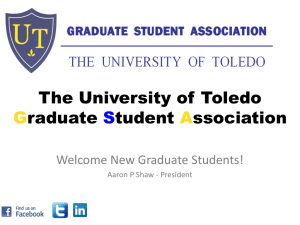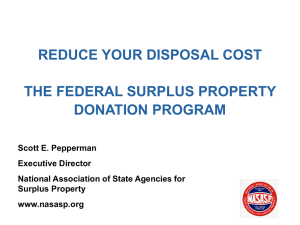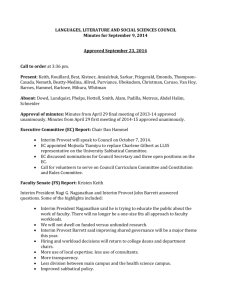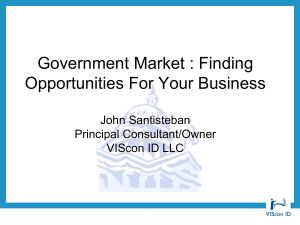Officer Reports 10-1..
advertisement
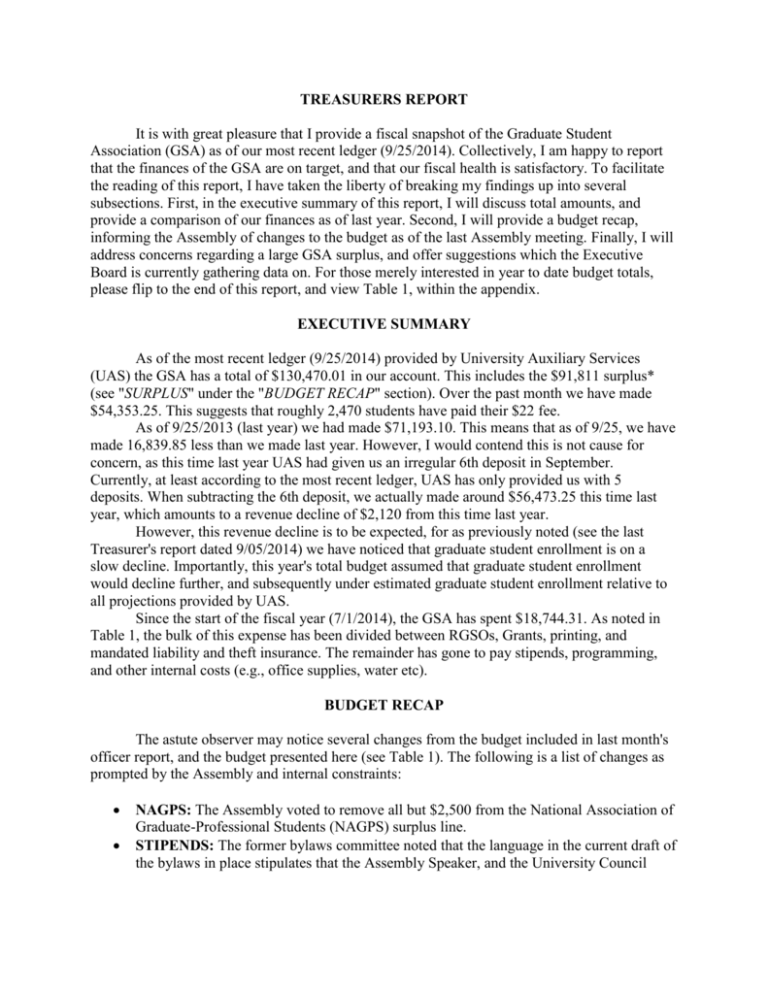
TREASURERS REPORT It is with great pleasure that I provide a fiscal snapshot of the Graduate Student Association (GSA) as of our most recent ledger (9/25/2014). Collectively, I am happy to report that the finances of the GSA are on target, and that our fiscal health is satisfactory. To facilitate the reading of this report, I have taken the liberty of breaking my findings up into several subsections. First, in the executive summary of this report, I will discuss total amounts, and provide a comparison of our finances as of last year. Second, I will provide a budget recap, informing the Assembly of changes to the budget as of the last Assembly meeting. Finally, I will address concerns regarding a large GSA surplus, and offer suggestions which the Executive Board is currently gathering data on. For those merely interested in year to date budget totals, please flip to the end of this report, and view Table 1, within the appendix. EXECUTIVE SUMMARY As of the most recent ledger (9/25/2014) provided by University Auxiliary Services (UAS) the GSA has a total of $130,470.01 in our account. This includes the $91,811 surplus* (see "SURPLUS" under the "BUDGET RECAP" section). Over the past month we have made $54,353.25. This suggests that roughly 2,470 students have paid their $22 fee. As of 9/25/2013 (last year) we had made $71,193.10. This means that as of 9/25, we have made 16,839.85 less than we made last year. However, I would contend this is not cause for concern, as this time last year UAS had given us an irregular 6th deposit in September. Currently, at least according to the most recent ledger, UAS has only provided us with 5 deposits. When subtracting the 6th deposit, we actually made around $56,473.25 this time last year, which amounts to a revenue decline of $2,120 from this time last year. However, this revenue decline is to be expected, for as previously noted (see the last Treasurer's report dated 9/05/2014) we have noticed that graduate student enrollment is on a slow decline. Importantly, this year's total budget assumed that graduate student enrollment would decline further, and subsequently under estimated graduate student enrollment relative to all projections provided by UAS. Since the start of the fiscal year (7/1/2014), the GSA has spent $18,744.31. As noted in Table 1, the bulk of this expense has been divided between RGSOs, Grants, printing, and mandated liability and theft insurance. The remainder has gone to pay stipends, programming, and other internal costs (e.g., office supplies, water etc). BUDGET RECAP The astute observer may notice several changes from the budget included in last month's officer report, and the budget presented here (see Table 1). The following is a list of changes as prompted by the Assembly and internal constraints: NAGPS: The Assembly voted to remove all but $2,500 from the National Association of Graduate-Professional Students (NAGPS) surplus line. STIPENDS: The former bylaws committee noted that the language in the current draft of the bylaws in place stipulates that the Assembly Speaker, and the University Council Representative will be paid $200 for their service. See more about this under "STIPEND PAY". SURPLUS: The original number UAS provided to us in their ledgers for the surplus we are carrying over was $92,849. However, upon an internal audit, it was revealed this number was incorrect, and the total amount of our surplus $91,811 ($1,038 less than what UAS originally quoted us). o SOLUTION: This error occurred because UAS provides us with ledgers which are supposed to show expenses for the entire month. However, UAS totaled our final report for June before the month of June had ended (6/25/2014), and expenses which were paid out from the previous fiscal year were not reflected in the surplus total. To prevent this mistake from reoccurring, I have requested UAS send future Treasurers year to date reports every month, as opposed to individual monthly reports. This way, the Treasurer will always have access to total yearly expenses and income in all reports. SURPLUS At the last Assembly meeting, several fiscal savvy members expressed concern with the GSA carrying over a large surplus from year to year. Generally, the concern regarding the surplus was derived from the notion that if we do not spend all money the GSA has available within a fiscal year, the graduate students who paid the fee for that year may be losing out on benefits or services which could otherwise be offered. This is an excellent point, worthy of discussion. As the fiscal agent of the GSA, I am taking the liberty of explaining some of the nuances with GSA revenue, and structural issues which create a surplus. I will end this report with a brief discussion of what the Executive Board is currently doing to respond to Assembly needs. REVENUE As stated in the previous Treasurer's report, the GSA currently has one source of revenue; namely, student fees. Although this fee has been mandated, not every student pays their fee in advance. In fact, due to the financial burdens many graduate students face, and the lack of adequate funding, many students choose to pay at least part of their bill using a University sanctioned payment plan. As a result, the GSA revenue for the Fall semester is not static, but rather rolls in throughout the semester. Although there is nothing wrong with revenue being disbursed over the duration of the semester, there are several consequences which we must consider when planning our budgets. First, our entire budget is based on enrollment projections. As discussed in my previous report, enrollment is declining, and has a seemingly large degree of variation from year to year (i.e., the standard deviation is hundreds of students). This makes it hard to generate a precise projection, and without surplus money to cushion GSA sanctioned events and grants, we would likely end up in a deficit without at least retaining some money as a surplus from year to year. PROJECTIONS This discussion of revenue has suggested that the GSA needs to create a projection under which we can pay for all available services to all available Assembly members. In order to do this without going into debt, there are two things which need to be considered when creating a projection. First, we must over estimate costs. For example, although not everyone uses all of their free printing, we need to make sure we have enough money to pay for the maximum allotted free printing for every Assembly member. Importantly, a good budget needs to reflect potential costs as well as direct costs. For example, we have extra money in paper, in case we are able to increase printing. We also have extra money in office supplies should a computer break down. These are costs which we cannot anticipate but must acknowledge. Second, we need to underestimate our revenue. For example, this current budget is based on a projection which assume that we will have 4,100 fee paying members in the Fall. We are actually more likely to have 4,200 - 4,300 fee paying members. Because we will generate more revenue than we anticipate, we are likely to end up with some sort of surplus. Because the variation within enrollment is so high, it is difficult to predict how many students will actually stay enrolled and pay their fee. This year's budget under estimated costs and over estimated expenses so that we could be 95% certain that we would not go into debt. However, one consequence of being fiscally responsible is that when things go well (i.e., more students enroll, and our equipment does not break down), we have extra money which can be carried over. STRUCTURAL ISSUES The primary reason we tend to have a large surplus has more to do with structural issues, as opposed to Executive Boards choosing to carry over the amounts. Although my predecessor, Jess Aubrin was fiscally conservative so as not to repeat the debt crisis of 2012, carrying over $91,811 was not her choice, but a consequence of regulations and current practices. ACADEMIC YEAR VS. FISCAL YEAR It is necessary to understand that the GSA is tied to the fiscal year designated by UAS. This means that even though our academic year ends in May, our fiscal year does not end until July 1st. This means that the summer (May - August) is actually comprised of two fiscal years. If we spent all of the money allocated for the academic year by May, we would have no money left for RGSO events and individual grants over the summer. Additionally, without a surplus, we would not be able to offer traditional GSA programming events (i.e., the orientation) and may not even have money for base operations (i.e., buying office supplies before the start of the semester). GRANT PRACTICES Another reason why we have a large surplus has to do with awarding practices for grants. Last year we provided $35,000 for grants, and had roughly $10,000 left over. Specifically, the Assembly currently takes an equal distribution approach to awarding funds, such that the total amount of money given to grants is divided in part by how many requests for grants we have. Although the grants committee works hard to make sure that funding is appropriately aligned with each request, we do not know for certain how many people will apply for grants. Perhaps one way to consider grant requests is to think of them as a delicate eco-system. If we have more people ask for grants, we theoretically have less money to give per person. If too many people ask for money, no one will get enough, many members will consider that it is not worth their time to apply for a grant. If enough students believe it is not worth their time to apply for a grant, they will stop applying, creating more money for those who do apply, repeating the cycle over again. RGSO PRACTICES Similar to grant practices, RGSOs awarding practices also create a large surplus. We awarded RGSOs $35,000 last year, and they had roughly $15,000 left over. However, unlike grant practices, which generate a surplus due to the uncertainty as to how many people could apply for grants (again, as previously discussed, we need to make sure we have enough money so ALL members of the Assembly could take advantage of our services), we know how many RGSOs there are on a semesterly basis, and we even know how much money they tend to apply for. Although RGSOs usually apply for all of their money, they actually only end up using $0.70 for every $1.00 we give them. INCREASED REVENUE Currently Assembly members, regardless of whether they are full time or part time, pay a fee of $22. This is a relatively new development, which has generated roughly $20,000 in extra yearly income. Although my predecessor was fiscally conservative, we have such a large surplus this year because the Assembly has not looked at ways to invest this additional funding. SUGGESTIONS The following is a list of various solutions to the aforementioned reasons as to why the Assembly has such a large yearly surplus. Note that, certain issues may not be easily rectified (i.e., the divergence between the academic year and the fiscal year). However, we should not seek to resolve all of the issues. When dealing with fiscal policy it is best to tread carefully, and experimentally manipulate practices while keeping data. So as not to put the cart before the horse, we need to consider a data driven approach to our finances. I do maintain that some surplus is healthy, and may even be necessary for the GSA to thrive. However, I would like to take a moment to discuss options, and outline some of the actions that the Executive Board is currently taking to address the Assembly concerns. It should be noted that the Executive Board is not currently taking any action to change current policies, but rather is brainstorming ideas which will then be submitted for Assembly vote with the needs assessment that I am currently developing. GRANTS: I am currently working with the Grants Chair to consider alternative models for awarding money to students. One way we could reduce a surplus, and make the GSA grants more meaningful, is to transition to a selective process. In other words, instead of every student being allowed to receive grant money, the GSA could take the 35,000 in grants and award 35 competitive research and professional development grants for $1,000 each. Note that these amounts are arbitrary, and one thing we want to consider with the needs assessment is whether or not the Assembly, as a whole, would be receptive to fewer, albeit larger grants. RGSOS: I believe that RGSOs under spend for two reasons. The first has to do with reimbursements. I am currently working with Kat to create a mechanism for direct payments. We believe that one reason why RGSOs only spend $0.70 per every $1.00 we give them is because graduate students are poor, and not able to spend their own money in advance. It is our opinion that the reimbursement model of RGSO purchasing is outdated, and no longer serves Assembly needs. However, we are working closely with our campus allies to make sure that any direct purchasing mechanism is fiscally sound, and within the purview of Board of Trustees policy. The second reason that RGSOs do not spend all of their allotted money is because some RGSOs are less active than others. Many times RGSOs may fall apart due to internal leadership concerns, and other times, events do not occur for a myriad of reasons (e.g., a guest speaker cancels, or there was an issue with reserving the room). Although I am not officially advocating for some RGSOs getting more money than others, I am currently working with the RGSO committee to consider guidelines that RGSOs can be given to help them make better budgets, as well as mechanisms which could be used to systematically award money in a reliable and valid manner. INCREASE REVENUE: We have increased revenue from the fee change, and I believe that one way we can spend some of this additional revenue is by investing in our relationship with NAGPS. Although some Assembly members may be initially concerned that this relationship is not worthwhile, and that it is unfair for representatives to use Assembly money to go the several of the more important events hosted by NAGPS, I contend that this is a relationship worth investing in, and that it would be unfair to make those we elect pay out of pocket for something that could be vital to our growth and development. When a person you elected, or their designee, goes to a NAGPS event, they are going there to represent your interests. I personally believe one reason why we often have poor election turn outs and a difficult time finding dedicated individuals to serve as our Senators is because there is a perception that they do not matter and that the Assembly does not support them. I am asking you to support your elected officials. However, affect aside, I believe that by investing in this relationship, we stand to gain a useful ally at a national level. By being an active member at the forefront of the NAGPS, we stand to benefit from shared knowledge of best practices of student governance. If this does not seem like it matters, consider this entire report. Look at all of the possible changes we are looking to make. We need data, and we need organizational knowledge which we simply do not have. I contend that this relationship will strengthen our position as graduate students within the SUNY system. I am asking the Assembly to think about this relationship in the long term. We cannot thrive as a graduate student government so long as we are only known for printing. Although immediate services offered are important, we need to think about ways that we can make being a graduate student in the SUNY system better for future students. It is our responsibility to seek out what we do not like, and make it better for the future. APPENDIX Table 1. YTD GSA expenses. EXPENSES AS OF 9/25/2014 Services Room Reservations RGSO Awards Grant Awards Contigency Budget (at 5% of projected revenue) GSA Welcome / End Year Events Operations BASE AWARDS 180,020.00 2,000.00 35,000.00 35,000.00 9,020.00 4,000.00 SURPLUS AWARDS 36,500.00 0.00 5,000.00 10,000.00 0.00 0.00 Contractual Goods and Services Liability and Theft Insurance 2,000.00 Printer Contract / Lease 20,000.00 Software Purchase / Renewal (Office / Antivirus) 500.00 Noncontracual Costs Paper 6,000.00 Office Supplies / Expenses 3,000.00 Phone and Fax 500.00 Water 1,500.00 Officer Stipends Stipend - President 4,500.00 Stipend - Vice President 3,500.00 Stipend - Treasurer 3,500.00 Stipend - MCAA Chair 3,000.00 Stipend - Programming Chair 3,000.00 Stipend - Grants Chair 3,000.00 Stipend - Lead Senator 1,000.00 Stipend - Senators 1,500.00 TOTAL AWARDED 216,520.00 2,000.00 40,000.00 45,000.00 9,020.00 4,000.00 0.00 0.00 0.00 2,000.00 20,000.00 500.00 0.00 0.00 0.00 0.00 6,000.00 3,000.00 500.00 1,500.00 0.00 0.00 0.00 0.00 0.00 0.00 0.00 0.00 4,500.00 3,500.00 3,500.00 3,000.00 3,000.00 3,000.00 1,000.00 1,500.00 PAID SUBTOTALS 18,744.31 100,020 0.00 7,906.69 2,771.49 3,295.00 0.00 1840.20 80,400 22,500 1,962.54 4,783.95 2,821.41 0.00 11,000 0.00 1,149.55 653.34 285.35 211.86 23,400 562.50 2,875.00 437.50 437.50 375.00 375.00 375.00 125.00 187.50 University Council Representative Assembly Speaker Office Managers ITS Consultant Professional Development NAGPS Strategic Plan Funding - President Strategic Plan Funding - MCAA Chair Strategic Plan Funding - Programming Strategic Plan Funding - Vice President Strategic Plan Funding - Treasurer 0.00 0.00 Administrative Support 23,000.00 500.00 0.00 4,500.00 4,500.00 6,000.00 0.00 0.00 200.00 200.00 0.00 0.00 2,500.00 3,000.00 3,000.00 10,000.00 1,500.00 1,500.00 200.00 200.00 23,000.00 500.00 2,500.00 7,500.00 7,500.00 16,000.00 1,500.00 1,500.00 0.00 0.00 2,028.12 0.00 0.00 0.00 0.00 0.00 0.00 0.00 23,500 2,028.12 36,500 0.00 Vice President’s Report 10-10-14 Assembly Meeting RGSO Funding and Recognition • I received and my Committee recognized and allocated funding to 28 RGSOs for the Fall Semester. • After the RGSO Committee went through their first round of allocation reviews, we had allocated over the 45% of the RGSO budget allocated for this semester. Seeing that the Committee had chosen not to fund certain events due to lack of justification or specific information regarding how the money was to be spent, the Committee decided to reduce the allotment for each RGSO by 10%, split as evenly as possible across each groups events, to reserve some money for appeals since they expected to get a few. • If your RGSO submitted any requests for Spring 2015 events, you did not receive funding because the RGSO Committee is only allocating for the Fall semester at this time. You can request funding for those events when you submit your recognition and funding application in the Spring. Remember: Items purchases with GSA money, such as sports equipment, chairs, reusable decorations, or any other items, become property of the GSA and must be returned to the GSA office prior to your voucher being processed for reimbursement. Be sure to get a receipt from the Office Manager when you return items as proof. RGSO Training • We held three RGSO Trainings and two make ups o Wednesday, September 17th 9-10pm, HU Amphitheater Downtown o Thursday, September 18th 3-4 pm and 4-5pm, GSA Office Uptown o Monday, September 29th, 12:30-1:30 and 1:30-2:30 • Almost all RGSOs who were recognized and received funding have attended a training • At training we covered many things including o RGSO Requirements o RGSO Benefits o RGSO Events – what to do before and after o Voucher Submission Process o The New Strike System for failure to fulfill required documentation for reimbursement • RGSOs also received their funding award letters at this training. Tax Exempt Reminder: We are not able to reimburse an individual for tax already spent so if you purchase something from PC then submit receipts for reimbursements you cannot get the tax back. This is tax law and an individual cannot use a tax exempt card for this purpose. If you are contracting with someone you can use a tax exempt number and not pay the tax. Committee Service: Please check with your RGSO E-board to see if they have been contacted about committee service. If not, please let me know and I will get in contact with them about their committee. Remember: • Please send all GSA related e-mails to gsavp@albany.edu not my personal Albany account. • RGSO Presidents need to send Caitlin their suggestions for Faculty Committee Service so she can make informed suggestions for faculty to serve on faculty committees through the Governance Counsel. • Send all listserv announcements to gsapr@albany.edu. Programming Chair Report – Hanna Marie Pageau Senator and Assembly Member Appreciation Reception o After the Assembly Meeting today Co-Sponsored the Bill McKibben talk with Sustainability Guerilla Programming o Senator Ben stood outside of a recent campus event with signs protesting against the bill HR-3393 which would revoke the Life Long Learning credit for graduate student’s tuition. Up-coming Programming o More guerilla-style involvement on campus over the next few months. o Holiday canned food drive (November) o Co-sponsoring ISSS Thanksgiving Dinner Efforts towards getting our ‘big speaker’ for the year o E-mails are going out (or have by the time of the meeting) to inquire into prices and availability for several speakers. Grants Report – Kim Berg The Grants Committee is in the process of evaluating applications and will be finishing those around October 7. Shortly after, award letters will be going out and grantees can begin to submit their reimbursement paperwork. The Grants Chair asks the assembly representatives to relay this information to their constituents who may have applied for a grant during Fall 2014. MCAA Chair – Amani Edwards This summer, I was becoming more acclimated to the position of MCAA chair and continuing to learn more about the GSA. My summer activities were minimal, however I did develop a plan and agenda for what I want to accomplish this year. This plan includes, 1. Begin ISSS outreach by the beginning of the semester 2. Begin a draft of the semesters schedule of events a. Thanksgiving meal b. Various cultural/spiritual/etc. holidays c. Possibly get the GSA word out in ISSS 3. Push the name change suggested by the GSA 4. Look at speakers to bring in a. Preacher Moss – funny and insightful b. Tim Wise – funny, insightful, expensive c. Black Jew Dialogues – amazing, not sure if they are still touring 5. Review the budget and make sure everything is being appropriated wisely. As a member of the diversity council, I have begun developing an agenda for that. However, due to a scheduling conflict, I am not able to personally sit in the meetings, but I have held interviews to pick a proxy that will sit in the meetings for me and report back. The proxy is Fusun Sahin from the Educational Psychology department. These interviews were completed Tuesday September 2, 2014. The agenda for the diversity council includes 1. More graduate student representation and events 2. Expanding our ideas of what diversity is – e.g. more than just race and gender 3. Faculty hirings/alumni panels for graduate students. Recently, I have formed my MCAA committee. The members are Tiara Xiao, GSA President Caitlin, Lauren Benz, Hirah Mir, and Tejas Rao. Our first meeting will be October 6th and will commence every other Monday from then until December 4th. President’s Report – Caitlin Janiszewski Community/Public Engagement – We had our first major public engagement meeting of the year. I gave a snapshot report to the Deans and Vice Presidents of what we do that is publicly engaged. I characterized our public engagement in two ways – our community service and programming that is executed by our RGSOs and programming committee each year and our new efforts to see the advocacy branch of our student government as something which should engage with the entities and movements external to the University. I gave them the example of our participation in the Legislative Action Days through NAGPS and our work with the EIO on the Ban the Box Campaign. There are two primary issues on the table for Public Engagement right now and that is finalizing assessment mechanisms. I have convinced the Public Engagement people that having graduate student report public engagement through Myinvolvement is a dead end and we are instead going to be surveyed with professional staff and contingent faculty. They are piloting that survey soon. The other issue is communication. It is clear that the President and the Public Engagement committee want to shift our sense of identity to be an institution which is publicly engaged. I made the point that in order for the GSA to play a meaningful role in this project we need better communication mechanisms instead of just blast email messages and an opt in listserv. A final point that I have articulated to some involved in Public Engagement is that there will have to be an incentive for graduate students (or anybody) to buy into this identity. It will have to be meaningful and value for us, not just be imposed. After the public meetings over the summer and my observations and communications with this committee I have emphasized to key people that constructing and framing public engagement in a way that it supports graduate students in terms of professional development is critical. I am trying to emphasize to them that graduate students face a job crisis and the community’s understanding of public engagement could be leveraged to help us network in the community. This is an evolving conversation and I will keep you posted. President’s Forum – I had a conversation with the Vice President for Student Success and she indicated to me that President Jones intends to only have one President’s Forum this year for only graduate students and separate one only for undergraduates. The time frame will again be 90 minutes but it will not be split with undergraduates. We are trying to nail down a time in late February or early March. I have emphasized that Thursdays and Fridays after 5 pm are preferable to accommodate graduate students who work full time and those who are taking classes Monday through Wednesday. I will keep you posted on these developments. SUNY SA – The SUNY SA Fall Conference is approaching fast. I am using my discretionary budget to send a proxy to represent us. I am sending Ben Mielenz one of our GSA Senators. He may present on the Ban the Box issue as a way of raising awareness about the campaign and taking questions and concerns to help form our resolution for the spring conference. GOV – I want to thank all the RGSOs who responded to my request for faculty recommendation sheets to help me do my duties on GOV. To clarify to anyone who may have been worried about what I was asking for; my suggesting of your faculty for these committees ties them to absolutely nothing. They can reject any request at any time. Service on these councils and committees is already an expectation of faculty in order to be promoted. By recommending them to me, you are providing the opportunity for me to empower them by suggesting them for important search committees like for our new provost or to serve an honors college board, or the UAS board. These are positions they cannot get unless they are nominated by this council. I do not usually recommend names very often on GOV because I do not know all of your faculty very well. But your recommendation sheets will mostly help me vote in an informed way once people have been nominated by someone else on GOV. I still have to vote on these slates of people regardless of whether I recommended or not. I could abstain but I’d prefer that graduate students play a role in forming these important committees. We can refine this mechanism over time. Committees and councils- Speaking of service, if anyone has not received their council and committee’s assignments for the semester or year please talk to me. Reminder, if you are on a non-GSA committee, such as a Senate council or a campus-wide committee you must send a report after your meetings or your committee service will not be counted. It is important that we have open lines of communication on these committees. Otherwise it is a waste of everyone’s time. President and Interim Provost Reports at Senate meetings – President Jones is looking into a "strategic alignments" with Albany Law (and perhaps downstate medical) as we pursue one of his "stakes in the ground" which is seeks to "expand our academic footprint". Albany Law would be financially independent but an academic unit at Albany. Also on the agenda for “expanding our footprint” is the roll out of a Computer Engineering program next fall which sets the stage for the development of a College of Science and Engineering. The President suggested that he has no intention of these expansions “cannibalizing” other programs but we await details on how he expects to construct these affiliations. Our former Provost Susan Phillips is in charge of brokering these special affiliations with Albany Law and/or Downstate medical. My sense is that this is an issue we should talk more about in this assembly and consider making part of our agenda to talk to the President about at the President’s Forum. I also believe that we should include the question of how graduate students fit in the President’s vision of community engagement and his strategy of reciprocity. The interim Provost, Tim Mulcahy has so far brought a great energy to Senate and Public Engagement meetings. He is one of the first administrators that I have heard specifically breakdown graduate students as a meaningful and important constituency. In the past we have been absorbed into “students” and overshadowed by our young undergraduate friends. I will be meeting with Dr. Mulcahy on October 20th to discuss graduate student issues with him. He has made a couple of things very clear this past month: 1 – he is not applying for the Provost position (to protect the integrity of the search) and 2- that he intends to move this University forward this year, not just act as a placeholder. Some of you may have heard the news the President has put the interim Provost in charge of reconsidering GTA stipends. Offices – The downtown office is open!!! And the uptown office is slowly getting its makeover. NAGPS LAD – Given that I have already expressed my support for us investing in the NAGPS I will refrain from commenting on the Legislative Action Days, and offer Ryan Gregoire and Kathryn Procknal a chance to speak on their experience at the meeting. My only comment is to say that I strongly believe we should continue participating in their programs. Lead Senator Report – Klil Neori Dear Assembly representatives, The first Senate meeting seems to have gone on well in my absence. Highlights included: President Jones's report focused on the Albany Law cooperation, as discussed by our President. The Interim Provost's report focused on the CNSE to SUNY IT transition timeline, to which Senators were generally favorable. The Senate Chair's report related that President Jones has signed approval for Graduate Certificate Programs in International Health and Human Rights, and in Teaching Composition, which were previously voted on by the Senate, as well as an undergraduate major in Biomedical Instrumentation. Letters of intent for a new major in Human Development, and more importantly for the College of Science and Engineering, one in Computer Engineering, have been drafted and were approved by UPPC, as that Council reported later. SUNY Senators' report: The Fall Plenary Session of the University Faculty Senate will be at SUNY-ESF in Syracuse, Oct 23-25. Elaboration on issues to come later. SUNY Office of Diversity and Inclusion and the UFS will host “Making Diversity Count: Ensuring Equity, Inclusion, Access and Impact” on Nov 1213 at Albany Marriot, 189 Wolf Road, Albany. More information can be found on the website: www.suny.edu/makingdiversitycount. SA report: Included status of various events. Those which to me seem to be of interest to GSA groups are the National Coming Out Reception and Festivities, with Reception on Oct 23, as well as National Diversity/LGBTQ History Month, where they are still planning events with Multicultural Affairs. They also have media contacts, including with the Times Union, which is worth considering for future cooperation. Councils and committees: CAA: Our representative was put on the Academic Program Review Committee. CoR: The meeting focused on addressing disagreements regarding faculty awards last year. The Committee resolved to make the process faster and more transparent, so as to make it easier for faculty to apply for them, and plan accordingly. Both Senator Tucker and myself were placed on the Subcommittee for Graduate Research Grants, while I was also put on the Committee on Research and Governance Issues. CPCA: Reports low representation from the Sciences, wishes to rectify through recruitment. GAC: Already had planning meeting on Sep 9 which did not include our representatives. Standing committees were formed and have had chairs elected. Expecting full docket this year, including new and changed graduate programs and grievances. GOV: Covered by our President. UAC: Committees already organized, agenda approved. Approved change of major name from Public Policy and Administration to Public Policy and Management. Several Gen Ed plans were approved, others returned to departments for revision. Competencies plan approved for Environment Sciences major. UPPC: Interim provost Dr. Timothy Mulcahy was introduced, Sue Philips (former Provost) updated on the transition of CNSE to SUNY IT. Approved initial proposals for Computer Engineering and Human Development majors, as discussed above. CAFFECoR, CERS, LISC, ULC: Nothing to report. We do need a new representative for LISC. I reiterate my encouragement of Assembly and GSA members to get in touch with me, whether through email, or through my office hours, if they wish to share any concerns they believe can be addressed through the Senate. UAS Report – Lisa Cassidy - Stephen Pearse (Executive Director) reviewed the status of some services on campus and indicated that the Hydration Zone has been a success. There are some functional things that need to be fixed but they are well used up to this point. They are also changing from paper to plastic cups because it will not only be cheaper but also be more in line with the idea of the hydration zone, which is to discourage the purchase of bottles water. -We also talked a bit about infrastructure changes with the new campus center coming in. Apparently, students will not be able to use their meal plan to swipe into the campus center anymore. There are a lot of issues surrounding this so they may designate a small "Meal Plan" committee to handle these issues until construction ends and the transition to the new addition is complete. -The company, Argo Tea, is going to be added to the dining options in the Campus Center - Apparently, CoccaDotts is doing extremely well. People buy the cupcakes for staff meetings and such. -One of the student board members went on a bunch of tours of other universities to check out their dining services and will be giving a presentation on that at the next meeting. University Council Rep – Nothing Reported
